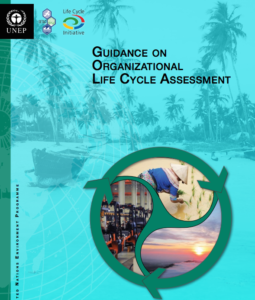 Edge Environment have contributed to the development of the recently released United Nations Environment Programme/SETAC Life Cycle Initiative Guidance on Organizational life cycle assessment. The guidance document includes a First Mover’ story of Edge and Inghams’ life cycle assessment work in Australia an Edge work with Walmart in Chile. According to Achim Steiner, Executive Director of the United Nations Environment Programme:
Edge Environment have contributed to the development of the recently released United Nations Environment Programme/SETAC Life Cycle Initiative Guidance on Organizational life cycle assessment. The guidance document includes a First Mover’ story of Edge and Inghams’ life cycle assessment work in Australia an Edge work with Walmart in Chile. According to Achim Steiner, Executive Director of the United Nations Environment Programme:
Organizations are increasingly recognizing that they need to understand their environmental impacts at all levels, including those throughout their value chains. Companies are engaging with partners along the entire value chain to assess opportunities for efficiency, increased competitiveness and access to new markets, as well as to strengthen their capacity to respond to risks such as those emerging from dwindling resources and climate change. Governments, too, are feeling a growing pressure to become more sustainable, either through sustainable purchasing decisions in their public procurement, or more broadly throughout their activities.
This report, Guidance on Organizational Life Cycle Assessment, is a milestone in measuring and improving environmental impacts and efficient use of resources at the organization level. It goes beyond assessing individual products, as has been done for many years, to encompassing an
organization—public or private, big or small—as a whole. The report provides guidance to organizations on understanding, quantifying and communicating the environmental footprint of their activities and those of their value chain, thus providing them with a robust basis for sustainability decision-making. Organizational life cycle assessment (O-LCA) empowers organizations to envision their sustainability strategy, steer the design of their products, and improve their processes. It enables them to play a role in supporting the shift to sustainable consumption and production patterns, and the transition to a low-carbon, resource-efficient and inclusive Green Economy.
This guidance document features 11 case studies of leading organizations that work beyond improving specific processes and products by progressively considering their whole value chains. In doing so, they have shown that life cycle assessment is an effective instrument for organizations, providing them with a sound scientific basis to underpin decisions towards sustainable consumption and production. The pioneers showcased are already reaping economic and other benefits of the life-cycle approach applied at the organizational level, for example through increased productivity and profitability by focusing their sustainability strategy where they can maximize positive change, identifying the most important potential partners within their value chains, and by communicating material and meaningful sustainability information to their stakeholders.
O-LCA is the most robust approach available to inform an organization’s sustainability strategy, and has the potential to become a reference point to strengthen the quality of information disclosed in sustainability reporting. It is a useful tool to advance the outcomes of the Rio+20 conference, such as the dissemination of corporate sustainability reporting and the promotion of sustainable consumption and production patterns.
With this publication the UNEP/SETAC Life Cycle Initiative adds to its relevant reference documents, which have contributed to raising global awareness and capacity in life cycle approaches.